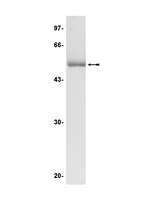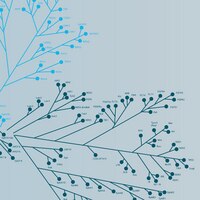Selective interaction of JNK protein kinase isoforms with transcription factors.
Gupta, S, et al.
EMBO J., 15: 2760-70 (1996)
1996
Afficher le résumé
The JNK protein kinase is a member of the MAP kinase group that is activated in response to dual phosphorylation on threonine and tyrosine. Ten JNK isoforms were identified in human brain by molecular cloning. These protein kinases correspond to alternatively spliced isoforms derived from the JNK1, JNK2 and JNK3 genes. The protein kinase activity of these JNK isoforms was measured using the transcription factors ATF2, Elk-1 and members of the Jun family as substrates. Treatment of cells with interleukin-1 (IL-1) caused activation of the JNK isoforms. This activation was blocked by expression of the MAP kinase phosphatase MKP-1. Comparison of the binding activity of the JNK isoforms demonstrated that the JNK proteins differ in their interaction with ATF2, Elk-1 and Jun transcription factors. Individual members of the JNK group may therefore selectively target specific transcription factors in vivo. | 8654373
 |
Transcription factor ATF2 regulation by the JNK signal transduction pathway.
Gupta, S, et al.
Science, 267: 389-93 (1995)
1994
Afficher le résumé
Treatment of cells with pro-inflammatory cytokines or ultraviolet radiation causes activation of the c-Jun NH2-terminal protein kinase (JNK). Activating transcription factor-2 (ATF2) was found to be a target of the JNK signal transduction pathway. ATF2 was phosphorylated by JNK on two closely spaced threonine residues within the NH2-terminal activation domain. The replacement of these phosphorylation sites with alanine inhibited the transcriptional activity of ATF2. These mutations also inhibited ATF2-stimulated gene expression mediated by the retinoblastoma (Rb) tumor suppressor and the adenovirus early region 1A (E1A) oncoprotein. Furthermore, expression of dominant-negative JNK inhibited ATF2 transcriptional activity. Together, these data demonstrate a role for the JNK signal transduction pathway in transcriptional responses mediated by ATF2. | 7824938
 |










